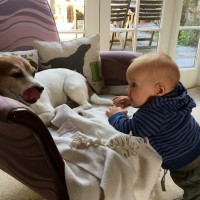
- I have first-hand experience of managing interactions between children & pets – it is not easy! My youngest is currently at the developmental stage I believe most pets find hardest – crawling (invading the animal’s floor space), starting to walk (wobbling), generally behaving unpredictably, cannot yet follow instructions, and absolutely fascinated by the furry 4-legged creatures – the default way to interact is to grab harshly. Introducing my first newborn to my dogs was the first challenge for me. It took months of preparation before the baby’s arrival and even then it was a fairly difficult first week. This experience has led me to provide Problem Prevention Telephone Consultations for expectant parents.
- It has opened my eyes to how busy life with children can be, and how balancing time for the family pet amongst work, kids, keeping the house running, making time for your partner & making time for yourself is a virtual impossibility at times! I can relate to these owners now far more than I could pre-children – my advice and expectations for these clients is now far more realistic than previously it might have been!
- It has taught me to have endless amounts of patience – something that is necessary when working with both pets and owners. (This is a work in progress with my own children at times!)
- I have felt desperation and been well out-of-my depth in the same way many owners describe to me when they just don’t know what to do with their pet! My eldest did not sleep. We tried everything. We ended up consulting with FIVE sleep experts… which leads me to my next point…
- I have been on the receiving end of an unregulated industry. From ‘Baby Whisperers’ to ‘Sleep Nannies’, I have listened to some of these people spout absolutely rubbish versions of Learning Theories, talk to me so condescendingly they made me cry, and gave advice that could potentially have been really damaging to my child. The thing is, in that time of desperation – even though I KNEW what they were saying didn’t add up or sit comfortably with me – we still tried their methods for a night or two before common sense prevailed. Then we were left with the guilt of what we had done and out-of-pocket to afford more professional help. This story is sadly too common for many of my dog owning clients in particular.
- I have learnt that there are many similarities in bringing up toddlers and pets. The mantra:
- Pre-empt any unwanted behaviours (set them up for success)
- Reward any good behaviours
- Ignore any unwanted behaviours (if they can be ignored)
- Interrupt any unwanted behaviours that cannot be ignored using distraction and then re-direct them onto a behaviour that can be rewarded
works for both children and animals!
7. Every child and every pet is unique and therefore advice has to be tailored specifically to that individual, taking into account lots of different factors including age, previous learnt behaviours, behavioural history, attempts to resolve problems, personality type, family situation etc.
8. Toddlers and dogs have a similar mental ability. If a toddler drops a cup on the floor and it smashes, they think the floor broke their cup. The same associative learning occurs with animals.
9. They focus on the here-and-now – yes, of course dogs and children experience both memories and anxieties, but they’re also much better at being mindful than us adults are. For example, a child splashing in a puddle will only be focused on that puddle at that time. The same with a dog sniffing a clump of grass on a walk. We should give both time to do these activities!
10. I have received well-meaning advice from friends, families and random people who have approached me to coo at my baby in the street – everyone seems to have some opinion or advice on what you should/shouldn’t be doing with your child – in the same way dog and puppy owners receive from fellow dog owners, dog walkers, and the bloke down the road who’s been ‘training’ dogs for 20 years… See point 5 above…